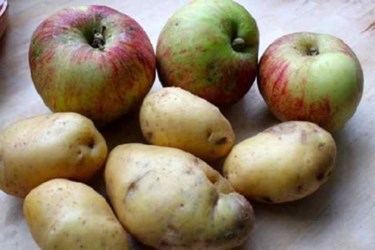GMO Apples And Potatoes Are OK With The FDA
By Melissa Lind, contributing writer

In a rare announcement from The FDA regarding genetically modified organisms (GMOSs) in food, the agency announced its approval of two varieties of genetically-modified apples and six varieties of genetically-modified potatoes on Friday, March 20, 2015.
Genetically-modified food products are highly controversial with many consumers, and some large food companies, wholly opposed to the practice of engineered foods. However, the FDA offered the approval of certain apples and potatoes maintaining the new strains are “as safe and nutritious as their conventional counterparts.”
Okanagan company scientists — creators of the new “Arctic” strains of Granny Smith and Golden Delicious apples — say the alterations were made to resist browning when the skin is broken. The changes were made by reducing the apples production of key enzymes, which contribute to the browning process. “Innate” potatoes, created by the J.R. Simplot Co., include six strains of Russet and Atlantic potatoes have been engineered to reduce the formation of black spots. The potatoes will also reportedly produce less acrylamide, a suspected carcinogen, when the potatoes are fried in high-temperature oils.
The creators of the genetically-modified produce were required to submit nutritional analysis to the FDA for final approval for marketing. The U.S. Department of Agriculture (USDA) had already approved the products, but does not have the final say on this type of food-safety issue.
Worldwide, nearly 40 percent of all food is lost, a big chunk of it due to spoilage. GMO proponents believe that this number can be significantly reduced. Food scientists and manufacturers say that changes to plant genomes will make produce healthier and taste better. They also assert that GMO foods will be easier to transport without spoilage, resulting in less food waste. However, there is large opposition to engineered food, both on the personal level and with large organizations.
Human rights advocates have also expressed concerns about genetically-modified crops, fearing that emergence of GMO foods may harm the small farmer. GMO seed is often more expensive and much harder to obtain in certain areas. There is also some concern that GMO crops will compete more diligently than the smaller, heirloom or indigenous crops, forcing those small farmers to purchase seed which they cannot afford.
GMO foods may enter the market as more attractive, longer-lasting produce, making the foods seem attractive. However, some point to the idea of genetically modifying food to be “prettier,” so that spoilage may not be readily identified and offering false security.
Consumers may also be unaware of what they are buying, as regulations regarding labeling of genetically-modified foods are not comprehensive, with some areas requiring complete disclosure while others have few requirements. No matter where consumers, producers, and suppliers fall on the GMO issue, GMO foods — at least six varieties of potatoes and two varieties of apples — are here to stay.
